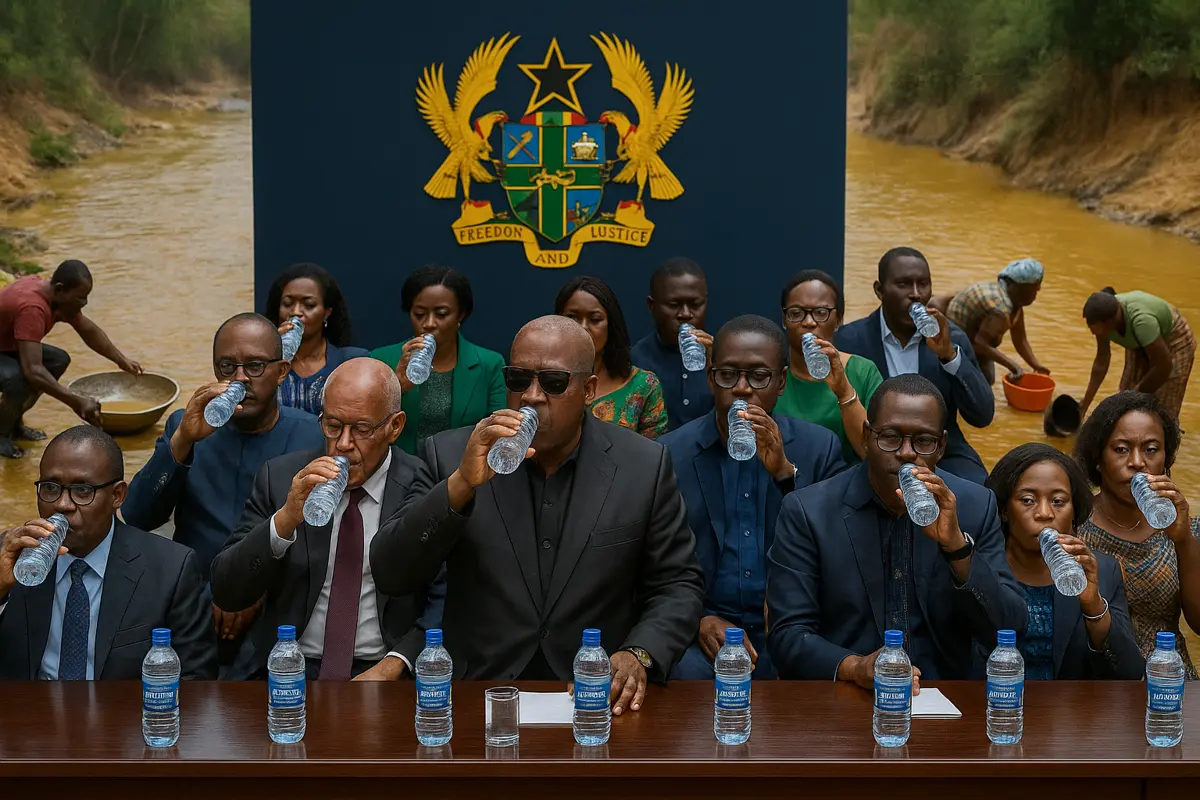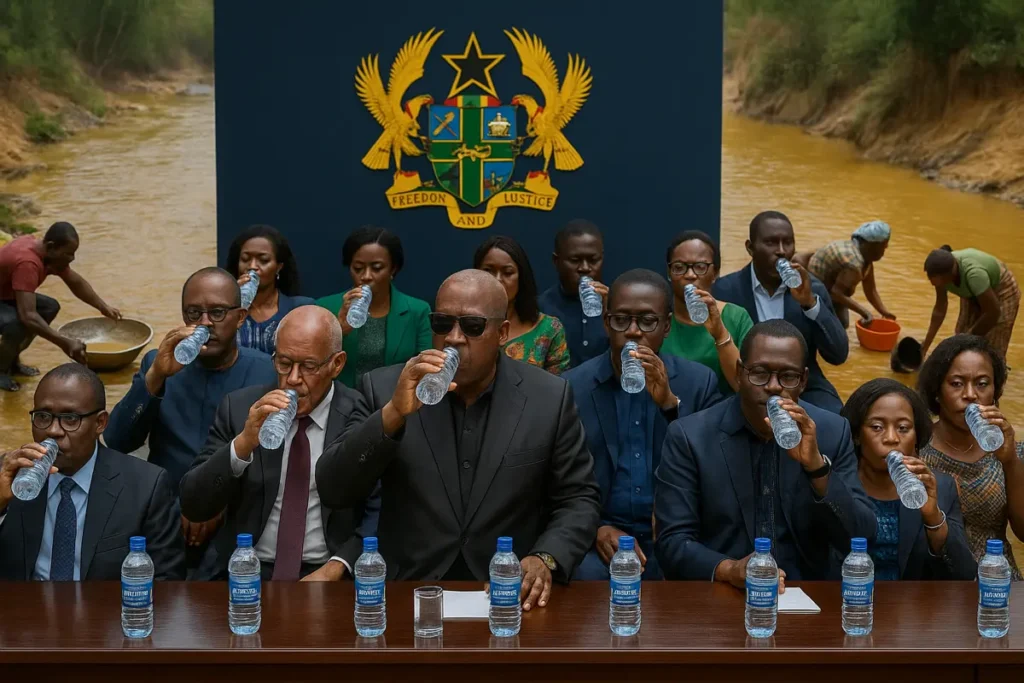
When Bottled Water Becomes Governance: A Republic Drowning in Irony
Bottled Water Governance Ghana has become the perfect symbol of leadership irony — a republic sipping purity while its rivers drown in filth.
They sat in a perfect row — well-tailored men and women, the crème de la crème of national management — each holding a bottle of purified water like a relic of survival. Behind them, the river that once carried life to farms and fish to tables now ran the color of sorrow. Brown. Thick. Tired. It was a tableau so poetic it deserved its own National Theatre performance: “The Republic Drinks to Its Own Extinction.”
Affiliate Disclosure: The Republic of Uncommon Sense maintains editorial independence.
If you purchase through certain links on this page, we may earn a small commission at no extra cost to you.
The photo, now immortalized across social media, shows officials solemnly drinking bottled water with the nation’s coat of arms looming behind them. It’s almost biblical — a last supper in the age of galamsey. A symbol of leadership hydrating itself while the rivers behind them gasp for breath.
The Republic of Bottled Water
In a land once called the Gold Coast, we now mine everything — gold, gravel, excuses. Rivers that once laughed their way through forests now drag themselves in silence, carrying mercury, cyanide, and the carcasses of promises made under mango trees during campaign seasons.
And yet, here they were — the faces of the Republic — sipping imported purity, while behind them, women scooped poisoned water with buckets. Governance, it seems, has now become the fine art of sitting in air-conditioned comfort while outsourcing suffering to those who can’t afford sachet water.
We no longer govern to protect rivers; we govern to purchase alternatives. Our agriculture is dying, so we import rice. Our education system is limping, so we fly our children abroad. Our rivers are bleeding, so we buy bottled water. Progress, Ghana style.
Irony as a National Policy
The irony of the photograph is thicker than the polluted water behind it. The same leadership class that organizes “Stop Galamsey” conferences in hotels with ten brands of bottled water on each table now wants us to believe they’re shocked at the state of our rivers.
In the Republic of Uncommon Sense, irony is no longer accidental — it’s administrative.
- We hold prayer breakfasts for environmental recovery, then sign mining licenses after dessert.
- We form committees to investigate pollution, then appoint the polluters as advisors.
- We preach patriotism, but our patriotism stops where profit begins.
A senior official once said, “The fight against galamsey is spiritual.” Perhaps that explains why we’ve turned it into a crusade without a congregation. We exorcise demons from excavators on TV, but the real devils wear suits and carry pens — not pickaxes.
The Great National Sip
Let’s study the photograph like a national curriculum: At the front, the dignitaries — stern, composed, hydrating responsibly. Behind them, the ordinary people — bent, laboring, fetching despair in orange buckets.
Two Ghanas captured in one frame. One drinks; the other drains. One poses for the future; the other inherits the consequences.
If you zoom in, you can almost hear the dialogue: “Gentlemen, let us raise our bottles to environmental awareness.” “Cheers — to filtered water, filtered conscience, and filtered accountability.” And somewhere beyond the frame, the rivers whisper, “We were once clean too.”
When Excuses Become a Natural Resource
Each year, we add new vocabulary to our dictionary of decay: taskforce, inter-ministerial committee, joint operation, operation vanguard, river guard, stakeholder forum… We hold press conferences to announce intentions, not actions. We sign memoranda of understanding that understand nothing. And every year, the water gets browner, the promises get longer, and the blame gets louder.
We have turned galamsey into a political football — kicked between the NPP and the NDC while the rivers play referee. When one party is in power, it blames the other; when both are in opposition, they blame the gods. In truth, we have only two teams in this endless match — they just take turns switching jerseys while the rivers keep conceding goals.
Meanwhile, our rivers — Ankobra, Offin, Pra, Birim, Tano — once sung about by palm-wine musicians, now appear in environmental obituaries.
The Gospel According to the Bottle
Bottled water is no longer a drink — it’s a sermon. It preaches quietly from every roadside cooler: “You failed to protect the source, now you must buy the symptom.” Each bottle is a receipt for negligence, a tax on irresponsibility, and a prayer for the next generation. The average Ghanaian spends more on water purification today than on electricity. We’re literally paying to survive the consequences of leadership decisions we didn’t make. And yet, when you raise your voice, they call you ungrateful — as though demanding clean rivers is a luxury.
Recommended: SugarMute — Support Your Health Journey
We champion choices that protect life and land. If you’re managing wellness goals,
SugarMute is a reader-recommended option to explore. Purchases help keep the Republic’s independent satire and investigations alive.
The Theatre of Responsibility
If symbolism could save rivers, Ghana would be Venice by now. We love ceremonies — we cut ribbons, we launch projects, we plant seedlings, we pose for cameras. Then, after the applause, the seedlings die, the projects stall, and the cameras move on to the next scandal. The bottled-water photo is just another act in this grand theatre. It will earn likes, provoke tweets, and inspire commentary — until next week’s scandal arrives. And somewhere, deep in the forest, a river will choke silently under fresh heaps of mining sludge.
Lessons from the River
What does the river teach us? That you can’t drink slogans. That development built on denial always floods downstream. That when you poison the land for profit, the invoice comes in the form of droughts, diseases, and disillusionment. The women scooping water in the background are not extras in a political documentary — they are the true face of Ghana. The Republic is not in Accra’s conference halls; it is in those villages where children still fetch water that smells like diesel, where farmers plant cocoa trees in soils that now taste metallic.
A Republic of the Parched
We are slowly becoming a bottled-water democracy — hydrated elites, dehydrated citizens. Our children will grow up learning that rivers are for mining and water is for buying. One day, when the last stream dries up and the last sachet price doubles, maybe we’ll finally understand that you can’t drink GDP figures or bathe in political promises.
But until then, we will keep hosting galamsey conferences in five-star hotels with imported bottled water, clinking plastic caps and declaring: “We are committed to ending this menace once and for all.” And when the journalists take the photo, we’ll pose solemnly, eyes forward, bottles raised — a nation drinking to its own memory.
Postscript from the Republic
The picture is worth a thousand words, but the truth it tells could fill a thousand rivers — if only they were still flowing. So here’s a humble suggestion to our leaders: next time, leave the bottled water at home. Walk to the riverbank, scoop a little of what we’ve made of God’s gift, and drink from that. If you can swallow it, perhaps the nation will believe you’re finally ready to lead. Until then, keep your bottles. The rest of us will keep our memories — and our thirst.
Read also: The Republic of Galamsey — Where Power Poles Sink and Presidents Blink
Context: UNEP on mercury in small-scale gold mining · WHO facts on drinking water safety
Book from the Republic
Love the Republic’s voice? Dive deeper into our world of wit, truth, and stubborn hope. Grab the latest book and support fearless storytelling from Ghana.
Join the Conversation 💬
What are your thoughts on Ghana’s bottled-water governance?
Drop a comment below and share this story with your network — irony tastes better when it’s shared.
💡 Every share spreads awareness — every comment sharpens the Republic’s wit.
